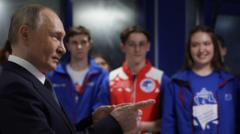In a revealing speech in Murmansk, President Vladimir Putin addressed the strategic interests of Russia in the Arctic, highlighting competition in the region and acknowledging U.S. intentions concerning Greenland. This statement sparked dialogue about the evolving relationship between the two nations, especially in the context of ongoing geopolitical tensions.
Putin's comments come as the Kremlin attempts to re-establish ties with Washington, particularly against the backdrop of Donald Trump's prior interests in acquiring Greenland. "America's plans regarding Greenland are serious and rooted in history. The U.S. will persist in advancing its geopolitical and economic agendas in the Arctic," Putin stated, making it clear that while Russia acknowledges these developments, the discussion regarding Greenland remains strictly between the U.S. and Denmark.
The shift in tone signifies a potential thaw in relations, especially since past administrations, such as that of Joe Biden, saw heightened criticism between the countries. Kirill Dmitriev, President Putin's envoy overseeing foreign investment, expressed a willingness to explore joint ventures with the U.S. in the Arctic, emphasizing logistics and infrastructure could prove beneficial for both nations.
However, Dmitriev maintained that before any agreements could materialize, the ongoing conflict in Ukraine must reach a resolution. He categorized debates about politics as secondary to the economic dialogue and noted that there exists a mutual understanding among negotiation teams from both countries.
Interestingly, recent interactions between U.S. officials and Russia have revealed a confluence of viewpoints, with some American representatives echoing Kremlin's narratives regarding Ukraine. This evolving rhetoric raises questions about the future trajectory of U.S.-Russian relations.
Discussing the larger implications of this geopolitical landscape, Nikolai Patrushev, a prominent aide to Putin, indicated a shift towards a multipolar world, prompting new possibilities for international cooperation despite divergent ideologies among the U.S. political parties.
Amidst these contemplations, the Arctic Forum showcased an ambitious spirit for development in the region, illustrated by a striking inflatable whale installation in Murmansk, drawing extensive public interest. Local sentiments revealed a mix of pride in Russian strength and uncertainty regarding the U.S. as a partner.
Amid discussions of Arctic resource management and international collaboration, Dmitriev highlighted admiration for American business magnate Elon Musk, hinting at potential discussions for collaborative ventures that could extend even to Mars exploration.
As Russia promotes itself as a potential ally in Arctic economic endeavors, the dynamics of its diplomacy with the U.S. present both challenges and noteworthy opportunities that may reshape international relations in the coming years.
Putin's comments come as the Kremlin attempts to re-establish ties with Washington, particularly against the backdrop of Donald Trump's prior interests in acquiring Greenland. "America's plans regarding Greenland are serious and rooted in history. The U.S. will persist in advancing its geopolitical and economic agendas in the Arctic," Putin stated, making it clear that while Russia acknowledges these developments, the discussion regarding Greenland remains strictly between the U.S. and Denmark.
The shift in tone signifies a potential thaw in relations, especially since past administrations, such as that of Joe Biden, saw heightened criticism between the countries. Kirill Dmitriev, President Putin's envoy overseeing foreign investment, expressed a willingness to explore joint ventures with the U.S. in the Arctic, emphasizing logistics and infrastructure could prove beneficial for both nations.
However, Dmitriev maintained that before any agreements could materialize, the ongoing conflict in Ukraine must reach a resolution. He categorized debates about politics as secondary to the economic dialogue and noted that there exists a mutual understanding among negotiation teams from both countries.
Interestingly, recent interactions between U.S. officials and Russia have revealed a confluence of viewpoints, with some American representatives echoing Kremlin's narratives regarding Ukraine. This evolving rhetoric raises questions about the future trajectory of U.S.-Russian relations.
Discussing the larger implications of this geopolitical landscape, Nikolai Patrushev, a prominent aide to Putin, indicated a shift towards a multipolar world, prompting new possibilities for international cooperation despite divergent ideologies among the U.S. political parties.
Amidst these contemplations, the Arctic Forum showcased an ambitious spirit for development in the region, illustrated by a striking inflatable whale installation in Murmansk, drawing extensive public interest. Local sentiments revealed a mix of pride in Russian strength and uncertainty regarding the U.S. as a partner.
Amid discussions of Arctic resource management and international collaboration, Dmitriev highlighted admiration for American business magnate Elon Musk, hinting at potential discussions for collaborative ventures that could extend even to Mars exploration.
As Russia promotes itself as a potential ally in Arctic economic endeavors, the dynamics of its diplomacy with the U.S. present both challenges and noteworthy opportunities that may reshape international relations in the coming years.




















